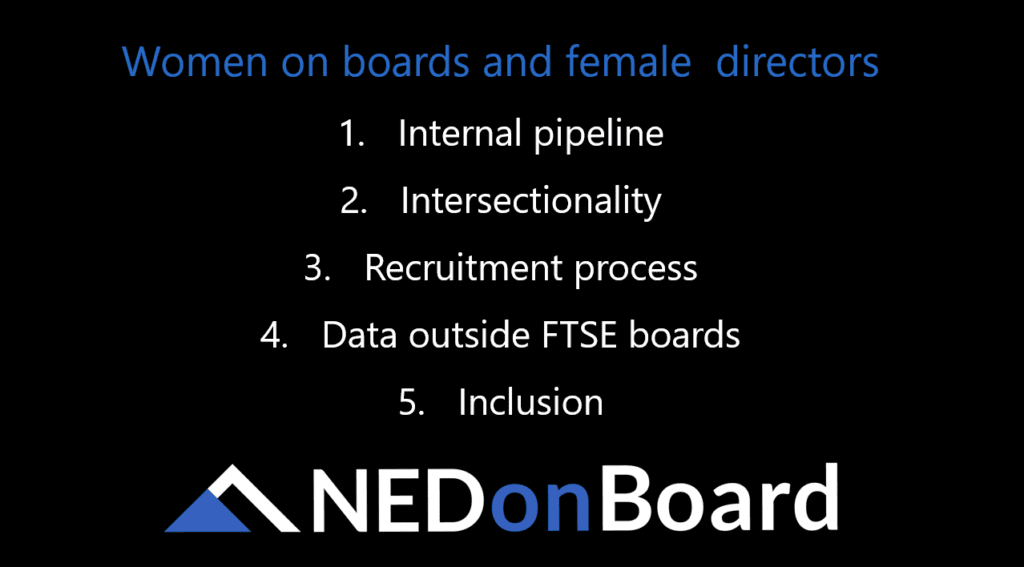Written by Elise Perraud, NEDonBoard COO
The 2020 Hampton-Alexander report evidenced progress in achieving higher representation of women on boards and female directors but there are 5 reasons why board members and NEDs should remain alert.
Fifth and final Hampton-Alexander Review
The 2020 report of the Hampton-Alexander Review was published end of February. This is the fifth and final report of the Review, a business- and data-led initiative that set a target of 33% of women on boards by 2020 and has tracked the representation of women on boards and in leadership positions in Britain’s largest listed companies.
Women represent about 40% in aggregate of non-executive directors and there are no All-Male boards on FTSE 350 boards. FTSE 100 boards met the 33% target at the beginning of 2020 (FTSE 250: end of 2020) and women’s representation now stands at 36.2%, up from 27.7% in 2017 (FTSE 250: 33.2%, up from 22.8% in 2017). The appointment rate of women on boards has remained stable for the past 3 years and two-thirds of roles are still going to men.
While there are reasons to celebrate the progress achieved in the past 5 years, board members, non-executive directors and members of nomination committees should remain alert. We recommend 5 areas of focus:
- Develop your internal pipeline of female directors through NED positions
Only 14% of executives on FTSE 100 boards are female directors. The proportion of women executives on executive committees is also relatively low at approx. 25%. As women senior executives are a crucial talent pool to be tapped into for board appointments, this pipeline must be sustained and grown to ensure that the representation of women on boards is maintained and continues its progress toward gender-balance.
NEDonBoard promotes the development of female director pipelines through professional development programmes that include a non-executive position.
Related post: Building an internal pipeline through trustee and NED roles
- Consider intersectionality
Because diversity is multi-dimensional, boards should consider intersectionality and look into women on boards and female directors that are from under-represented groups, such as BAME professionals, next gen leaders or those with unconventional professional or social backgrounds. Intersectionality allows for diversity of thinking, which is vital to healthy and constructive debates in UK boardrooms for good decision-making and decision-making for good.
- Attract talents and expertise through an open, fair and transparent recruitment process
The Secretaries of State for BEIS and International Trade and Minister for Women and Equalities write in the Joint Ministerial Foreword 2020 of Hampton-Alexander report that: “When systems are open and recruitment processes transparent, we are more likely to see a talented and diverse workforce”. NEDonBoard fully supports this statement. We strongly encourage organisations looking for advisory board members and non-executive directors to advertise their vacancies widely and openly so that more candidates, including female directors and other under-represented professionals, have the opportunity to apply, leading to a more selective recruitment process, so higher-caliber non-executives and greater diversity. The NEDonBoard jobs board is open to organisations looking to attract strong and diverse talents.
Related post: Rethinking the board recruitment process to increase diversity in the boardroom
- Get data points outside FTSE boards
We lack data points when it comes to diversity outside large listed companies as the Hampton-Alexander Review has focused its analysis and efforts on FTSE 350 boards. NEDonBoard supports Sir Philip Hampton’s recommendations to look into large private companies. A pilot research published by NEDonBoard indicates that private boards lag behind FTSE boards in appointing women on boards as well as professionals from ethnic minorities.
Related post: NED Diversity and Inclusion in Privately Owned Firms
- Think about inclusion
Diversity without inclusion cannot be sustained. Diversity only sticks in inclusive environment in which diverse professionals are welcomed, valued and successful and in which they have a voice that is heard, considered, and acted upon. Boards and non-executive directors should be reminded that diversity does not drive inclusion. It takes cultural and behavioural changes within an organisation to create an inclusive environment.
If you are an organisation interested in being a more diverse board: advertise your board vacancy with NEDonBoard and tap into a deep, diverse, and strong network of professionals to attract the most suited talents and skills to your board of directors or board of trustees. Email [email protected] to find out how our enhanced listing will achieve your diversity objectives.
If you are an organisation interested in developing your internal pipeline of talents, NEDonBoard can support you. Email us at [email protected].
If you are an individual looking to become a non-executive director and position yourself for director roles, watch our complimentary webinar How to secure your first NED role.




